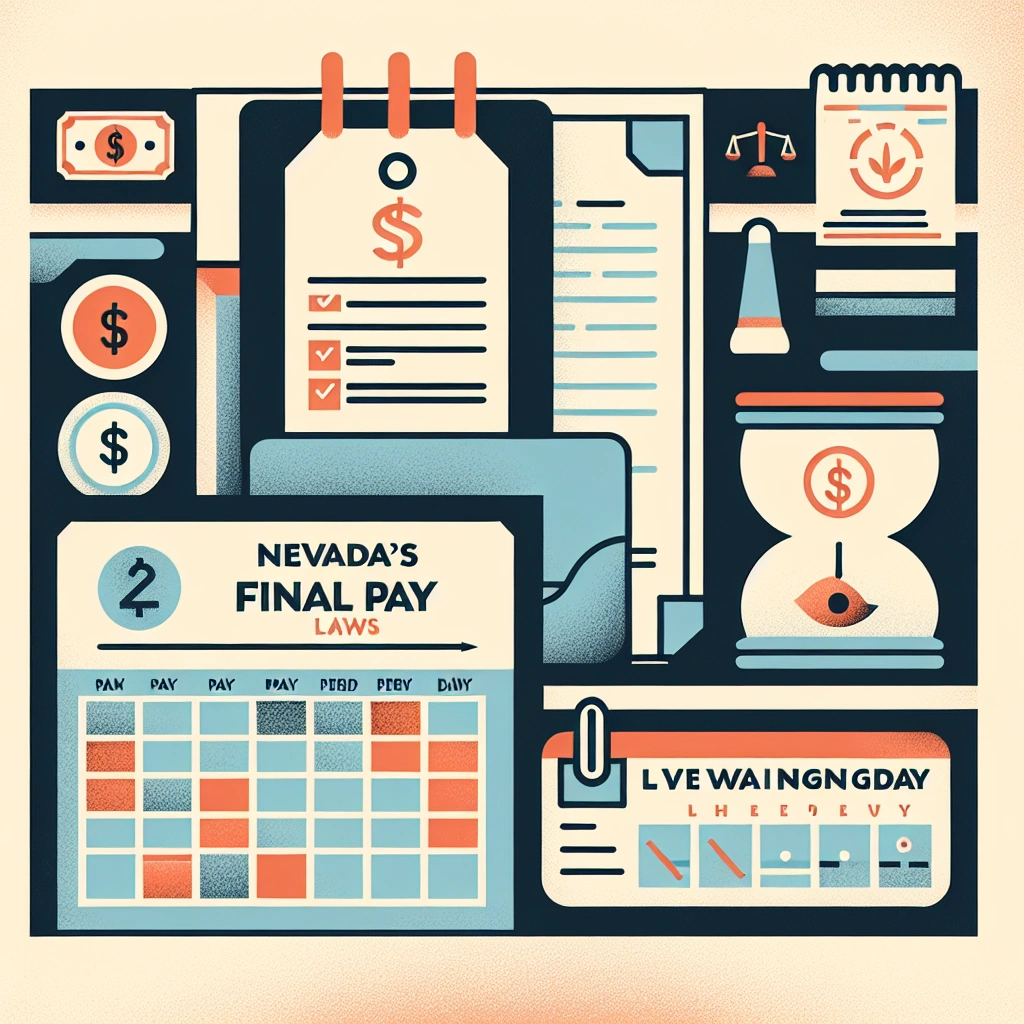Understanding Nevada Final Pay Laws
Short Answer
Yes, Nevada has final pay laws that mandate immediate payment of final wages to discharged employees, encompassing unpaid wages like regular hours, overtime, and accrued vacation time. Non-compliance can result in significant penalties for employers.
Check out this Youtube video: Get informed about the Nevada final pay laws and other important labor laws that can protect your rights as an employee.
Key Takeaways
-
Nevada final pay laws mandate immediate payment of final wages to discharged employees, encompassing unpaid wages like regular hours, overtime, and accrued vacation time.
-
Non-compliance with Nevada final pay laws can result in significant penalties for employers, including monetary fines and potential legal action from affected employees.
-
The state’s final pay laws define wages and benefits to ensure fair compensation for employees, while also prohibiting gender-based wage discrimination in the workplace.
-
Civil penalties for violations of Nevada final pay laws can be severe, with fines ranging from $10,000 to $20,000 for a first violation, emphasizing the state’s strict stance on enforcement.
-
Employers in Nevada must adhere to the stringent guidelines of Nevada final pay laws to avoid facing legal recourse and financial penalties, with specific rights and repercussions outlined in the Nevada Administrative Codes and statutory provisions.

Nevada Final Pay Laws Explained
In Nevada, employers must provide the full and final paycheck immediately upon termination, encompassing all unpaid wages including regular hours, overtime, and accrued vacation time. Employees are entitled to receive their final wages within 3 days of dismissal or layoff as stipulated in the Nevada Revised Statutes 680.020-NRS 608.040. Non-compliance with these laws may result in monetary fines and potential legal action pursued by affected employees, and employers may be subject to penalties enforced by the Nevada Labor Commissioner.
What are the rules on final paychecks in Nevada?
In Nevada, the rules on final paychecks are outlined to ensure timely compensation for discharged employees. When an employee is terminated, whether through dismissal or layoff, Nevada law mandates that the employer must provide the full and final paycheck immediately.
This final payment encompasses all unpaid wages, including regular hours, overtime, and accrued vacation time. If the employee is dismissed or laid off, they are entitled to receive their final wages within a specific timeframe, typically within 3 days as stipulated in the Nevada Revised Statutes 680.020-NRS 608.040.
Key provisions of Nevada final pay laws
Nevada final pay laws encompass several key provisions that employers must adhere to in order to comply with state regulations. These provisions cover the prompt issuance of the final paycheck to discharged employees, incorporating all outstanding wages such as regular compensation and accrued leave entitlements.
Additionally, employers are obligated to ensure that all terminations are handled with timely precision, delivering the final paycheck within the stipulated legal timeframe. The provisions serve to protect the rights of employees by safeguarding their entitlement to full and expedited compensation upon termination.
Penalties for non-compliance with Nevada final pay laws
Non-compliance with Nevada final pay laws may result in significant penalties for employers. Failure to adhere to the specified regulations can lead to legal repercussions, including monetary fines and potential legal action pursued by the affected employees.
Employers who violate the provisions regarding final paychecks may be subject to penalties enforced by the Nevada Labor Commissioner, further exacerbating the financial and legal implications of non-compliance. It is imperative for employers to uphold the stipulated final pay laws to avoid adverse consequences and uphold employee rights in the state of Nevada.
| Rules on Final Paychecks in Nevada | Key Provisions | Penalties for Non-Compliance |
|---|---|---|
| Employers must provide full and final paycheck immediately upon termination | Final payment encompasses all unpaid wages, including regular hours, overtime, and accrued vacation time | Non-compliance may result in monetary fines and potential legal action pursued by affected employees |
| Employees are entitled to receive their final wages within 3 days of dismissal or layoff | Provisions cover prompt issuance of the final paycheck to discharged employees | Employers may be subject to penalties enforced by the Nevada Labor Commissioner |

Key Provisions of Nevada Final Pay Laws
The key provisions of Nevada final pay laws include immediate payment of final wages upon discharge, with a requirement for payment within 3 days for employees who are discharged and within 7 days or the next regular payday for those who resign. The laws also define minimum wage standards for employees, specifying $7.25 per hour with health benefits and $8.25 per hour without. Furthermore, Nevada prohibits discrimination based on sex in wages, except in cases of seniority, merit, quantity or quality of production, or other non-sex-related factors. This ensures prompt compensation, fair minimum wages, and gender equality in the workplace.
Immediate payment upon discharge
Employees in Nevada are entitled to immediate payment of their final wages upon discharge. According to Nevada Revised Statutes 680.020-NRS 608.040, if an employee is discharged by their employer, they must receive their final wages within 3 days.
Conversely, if an employee voluntarily quits, they are entitled to receive their final wages within 7 days or by the next regular payday, whichever comes earlier. This serves to protect the rights of employees and ensures timely compensation when their employment ends.
Definition of wages and benefits
The Nevada final pay laws define wages and benefits in a manner that safeguards the rights of employees. These laws state that each employer must pay a minimum wage to employees, which was set at $7.25 per hour worked if the employer provides health benefits, or $8.25 per hour worked if health benefits are not provided.
This provision ensures that employees receive fair compensation for their work, in alignment with the established minimum wage standards.
Discrimination on basis of sex prohibited; exceptions
Nevada unfalteringly prohibits employers from discriminating between employees on the basis of sex by paying lower wages to one employee than to another for work that requires equal skill, effort, and responsibility. This demonstrates the firm commitment of Nevada’s final pay laws to uphold gender equality in the workplace, ensuring that all employees, irrespective of gender, receive equal compensation for comparable work.
However, there are exceptions to this prohibition in certain circumstances, such as when wage differentials are based on seniority, merit, a system that measures earnings by quantity or quality of production, or factors unrelated to sex.

Penalties for Non-Compliance with Nevada Final Pay Laws
For non-compliance with Nevada final pay laws, civil penalties for violations can be severe. According to NRS: CHAPTER 608, the first violation can result in a fine of not less than $10,000 nor more than $20,000. Subsequent violations carry even heavier penalties, emphasizing the state’s strict stance on enforcing these laws.
When it comes to legal recourse for employees, the Labor Commissioner in Nevada ensures that employees have specific rights. For instance, if an employee is discharged, they must receive their final wages within 3 days, as outlined in the Nevada Revised Statutes 608.040. Additionally, if the employee quits employment, the final wages must be provided within 7 days or by the next regular pay day, whichever is earlier, according to the state’s regulations.
Instances of successful legal actions against employers serve as significant deterrents for non-compliance. Employers in Nevada must adhere to the stringent guidelines to avoid facing legal recourse and financial penalties.
The Nevada Administrative Codes and statutory provisions offer clear guidance on the rights of employees and the repercussions for employers, illustrating the seriousness of complying with final pay laws in the state.
Non-compliance with Nevada final pay laws can lead to hefty fines, emphasizing the state’s firm stance on enforcing these regulations. Employees have specific rights regarding their final wages, and any violations can lead to legal action against employers, underlining the importance of adherence to these laws in the state.
